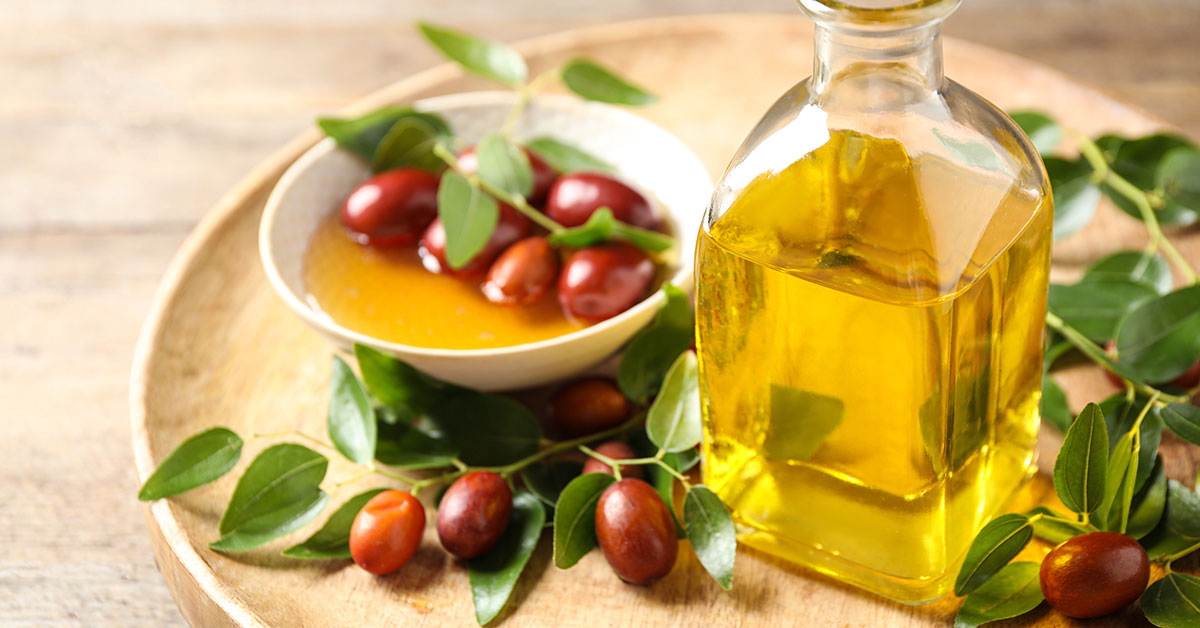There are few beauty products that are as straightforward as an essential oil. Whether you slather a drop or two onto your problem areas—be it that dry patch on your skin or on the split ends of your hair—it’s easy to resume your life once you’ve applied. However, choosing an oil out of the dozens of oils out there to add to your skincare routine isn’t always easy to figure out.
There’s coconut, rosehip, argan, and grapeseed oil, to name a handful—all of which contain unique properties that can benefit your skin and hair in impressive ways. But another oil that deserves a humble brag is jojoba oil, a versatile skincare oil that deserves a spot in your medicine cabinet.
What is jojoba oil?
Jojoba oil is derived from the seeds of the jojoba shrub, a perennial native to the North American deserts. The oil accounts for 50% of the jojoba seed and is extracted by cold-pressing--a process that helps maintain the rich nutritional value of the oil.
Similar to other skincare oils, jojoba oil contains a multitude of vitamins, antioxidants, and anti-inflammatory properties, yet what sets it apart from the others is that it’s technically not an oil, but a wax ester.
What this means for your skin is that jojoba oil has a similar molecular structure and composition to sebum, which the skin naturally produces for moisturization. In essence, jojoba oil mimics the skin’s sebum and balances out your complexion, adding more sebum where it’s needed, and winding down production where it’s not. As for your hair, sebum also naturally coats your strands, so applying jojoba oil where you need it the most can make your hair feel soft and even boost shine.
Its chemical composition also makes it one of the more stable oils around. While other oils tend to go rancid quicker, jojoba oil typically has a much longer shelf life.
Choosing the best jojoba oil for your skin and hair
When shopping for jojoba oil, make sure it’s 100% pure—organic, cold-pressed, unrefined—because processed oil that contains preservatives and other ingredients may irritate the skin and cause adverse side effects, such as eczema or allergic reactions. It’s also important to check out the list of ingredients to ensure that jojoba is listed as the main ingredient, as opposed to a supplemental product added in.
Jojoba as the main ingredient means you’re getting an adequate amount of the product so it can fulfill your desired skin and hair needs. Pure jojoba oil usually possesses a straw-like color that can range from yellow to gold, and one of its best characteristics is its ability to absorb fast, so if a jojoba oil feels like it’s just sitting on top of the skin, it’s likely a lower quality product.
Benefits of jojoba oil
- Improves the skin barrier - Jojoba oil is loaded with antioxidants, such as vitamins A and E, and omega-6 fatty acids, which are essential components of the skin’s barrier. It also acts as a humectant, meaning it works to retain moisture in the skin. This protective layer, combined with the anti-inflammatory effects of the vitamin E, gives skin the breather necessary to focus on the healing process, which is especially beneficial to those with eczema or psoriasis.
- Soothes dry skin - Similar to other oils, jojoba oil is great for soothing dry, irritated skin, as its anti-inflammatory benefits help calm the complexion, while providing the hydration it needs to restore itself. And because it’s a humectant, it forms a protective seal over the skin to prevent future moisture loss.
- Treat acne - Jojoba oil’s chemical composition allows it to mimic the skin’s sebum, therefore it balances out the skin by not overproducing oil in areas of the skin where it’s not needed. It also contains antimicrobial properties that can ward off certain types of bacteria, making it an excellent choice for acne-prone skin.
- Delay signs of aging - As it’s naturally rich in vitamin E, a potent antioxidant that helps the skin defend itself against free radicals that can cause premature aging and skin damage, jojoba oil is also rich in amino acids, which are the building blocks of collagen. The result is a reduction in the appearance of fine lines and wrinkles, and improvements in skin texture, tone, and elasticity.
- Fight cold sores - Most of the more popular oils, such as tea tree or peppermint can help lessen the severity of a cold sore, however these oils need to be diluted by a carrier oil so they don’t irritate the skin, and that’s where jojoba oil comes in. Jojoba oil happens to contain docosanol--the active ingredient in OTC cold sore creams--which does its thing by inhibiting the virus from getting to healthy skin cells.
- Remove makeup - Jojoba oil makes for a great makeup remover, as it’s lightweight and non-greasy. Plus, it gets all of your makeup off without tugging at the skin.
Summary
If your skincare routine is in need of a pick-me-up, try jojoba oil for a variety of uses. Since it’s a potent multitasker that can totally transform your beauty routine, jojoba oil will leave you with a glowing complexion and glossy locks.





